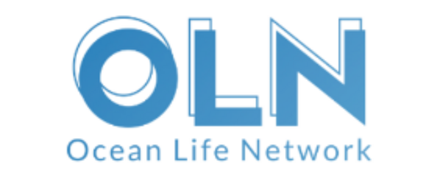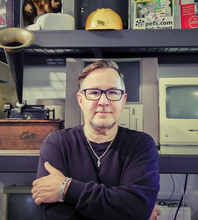Friday, September 8, 2023
Interview with Richard Wolpert, Ocean Life Network

So tell us about this new venture?
Richard Wolpert: The new venture is called Ocean Life Network. It's going to be a digital media company around all things ocean. We will have a website, but the real focus to start is going to be a TV FAST channel that covers everything about ocean life. When I say all things ocean life, it's everything from kite surfing to a yacht that charters for $1.1 million a week, that films the life of the crew,kind of a true reality version of Below Deck. We have people who are doing solo circumnavigation of the world, we have families who've been living on boats for a decade, we have people that fish, people who are spear fishing, and we have “boat fails”, people taking their boats out when they shouldn’t. It covers people's passion for the ocean. I’m not calling it niche content, I'm calling it specialized content. It's specialized content, because it's all around the topic but it has a mass appeal audience. We know, the mass appeal of Below Deck is one of Bravo's most successful shows over ever, I know, from Jukin Media,the success of “fails”. When you see the adventures that some of these people get stuck in--like massive hurricanes while they're out on a 45 foot sailboat in the middle of the ocean, it’s just very compelling content, even if you’re not someone who would be doing that.
When do those channels launch?

Richard Wolpert: We're launching October 15. Most FAST channels launch with around 200 hours of content that they just play over and over and over again, where we're launching with 20 different shows, and a year's worth of content when we go live.
As you know, technology investors tech to be adverse to investing in content. As an investor yourself, what was your thinking in launching a content startup, anyway?
Richard Wolpert: Yeah, it's a great point. The traditional venture capital companies did dabble in content in the past, mostly in like the late 90s and early 2000s. And most of them got burned. And those burn scars remain. And they're kind of generally adverse to content—although that’s not completely true. I spend a day a week with Acrew Capital, and recently lead a 5 million investment in Cannella Media. Cannella Media is a FAST channel company that has seven channels, all in Spanish language. Their specialization is Spanish content. I can't give you the numbers, but that company is growing exponentially, and just in the last few years. If you look at even a Netflix or an HBO Max, they're successful in terms of revenue and subscribers, but they're not successful financially right now, because their production costs are insane. Netflix did 30 billion in revenue, but spent 16.7 billion on content production last year. Yhat's the type of model that has, you know, made venture capitalists and investors stay away. If you contrast that though, with YouTube, YouTube also did $30 billion in revenue last year, but its upfront production costs was zero. I mean, they do share a lot of that money with the creators, but that's based on revenue, not upfront expenses.
How does a FAST channel work, and what’s the business model behind them?
Richard Wolpert: The core revenue model for fast channels today is ads and sponsorships. FAST stands for Free Ad Supported Television. So it kind of says it right in the name, that the primary business model is ad supported. Ad supported also includes in it sort of sponsorship, so you may have a sponsor who wants to sort of own a show, and have their branding in the show, not just in the advertisements. That's the core revenue model for everybody in the FAST space. We've also done something unique in that we've made all of our creators partners, in a couple of ways. One is they get 50% of any revenue that we get. The other is that I set aside a 5% equity pool and ownership in Ocean Life Network. And all of our content creators that we're launching with will get a portion of that equity, which ill be divided at the end of year one based on the popularity of their content. So everybody will get something and the most popular people will get even more. What that's allowed me to do is launch this network, like YouTube, with no upfront production fees, or licensing fees at all, and to be able to have a year's worth of content. Another interesting thing, is we have already a growing boat test business. Our team has a guy named Captain Steve, who used to work for a company called Boat Test for 17 years. He's an expert in the space, and we're being paid by boat manufacturers already. We've done I think a dozen boat tests already, and we’re paid to do them, which generates content, which we then put on our FAST channel. Unlike the studio model, which is to pay for content that they then put up and try and monetize, our business will have two revenue models, and one will be to be paid for the production, and to take that production we were paid for, and put it on television and make additional money on it.
Boat and sailing content has been very popular on YouTube. Why do you think that is?
Richard Wolpert: I think it's a combination of people who do it, who want to learn, but probably the bigger audience is the people who are curious about what it's like, to live on a boat 24/7/365. What do you get to see? What are the problems? The story arcs on some of these people, it's just amazing. We've been talking for five years about is this the Creator Economy, right? Unfortunately, two years ago, all the talk was, the Creator Economy is alive and well in the NFT space, and that's where the focus was. And we all know what happened with NFT's. But, still, the Creator economy is alive and well. And it's on YouTube. Mr. Beast last year made $54 million on YouTube ads. There's a lot of people, including many of our creators, who are completely financing, not just their living expenses, but the fees, the money that they have to spend every month to fix their boats, pay for marinas and docking and everything else on their YouTube channels.
Speaking of which, what’s the advantage of your channels vs. YouTube?
Richard Wolpert: I have tremendous respect for YouTube as a platform, however, it’s more of al lean forward experience. You're picking and you're choosing and you're searching and you're pecking where TV has always been much more of a lean back experience where you're choosing something to watch and you watch it more long form, for more than 30 minutes at a time. There's a lot of a lot of our creators have hundreds of thousands to two to 3 million subscribers, not just on YouTube, but also 100’s of thousands on Instagram and Tiktok as well. What we're affording them is the ability to bring those stories to television, which is additive to what they're doing. I saw that at FailArmy, right, we had a great YouTube channel. And then we put up a FAST channel, the YouTube channel grew. It didn't decline, it grew. Because on TV, people were being exposed to the brand. And that will drive some people to YouTube to look for it. But then there was this whole new revenue stream and FAST TV, which was bigger than the revenue stream we were getting on YouTube. The boating industry is far bigger than people think. Last year, the marine industry in the US was $56 billion. And 13% of US households own a boat. So, we have an audience that's massive, it's not like this little niche audience that nobody's paying attention to. If you drive through any marine, you will see hundreds of thousands of multi-million-dollar boat after boat sitting in those marinas. A lot of our audience is a little bit older, 40, and up, and those people are not on YouTube. And those people are not finding the shows. Those people are watching FAST channels. What we're doing is taking what people are already doing that is successful on YouTube, and we're amplifying it on television. But we're still promoting their brand.
What are your near terms plans and what should people be watching for?
Richard Wolpert: We're working on closing all of our initial distributor deals, because you can have a FAST channel, but if you're not on, you know, Pluto, or Roku, or Fire TV, or any of this doesn't matter. We're now heads down on closing the distribution deals, the channel will go live, probably not on every platform, but in October, and then my guess is between October and the end of the year, we'll be on all the platforms that we need to be on. Our phase now is getting the distribution deals done, and, creating and editing all the shows with all the content we've been given.
Thanks for the interview!